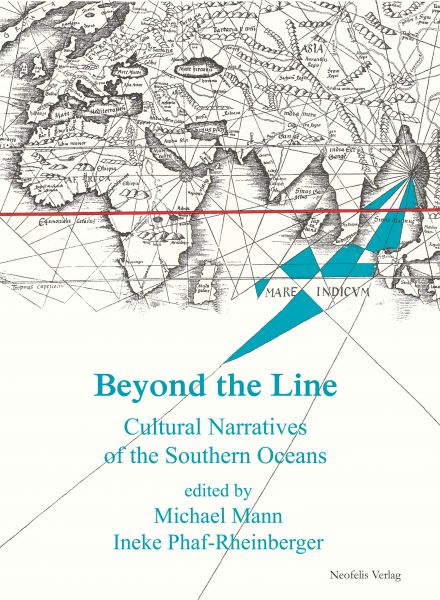Beyond the Line
Cultural Narratives of the Southern Oceans
The title of Beyond the Line refers to the imaginary "Line" drawn between North and South, a division established by the Peace Treaty of Cateau-Cambrésis in 1559. This is an early modern time and Eurocentric construction, according to which the southern oceanic world has long been taken as symbol of expansionist philosophies and practices.
An obvious motivation for changing this "Line" division is the growing influence of the "Global South" in the contemporary economic and political setting. However, another motivation for changing opinions in regard to the "Line" is equally important. We observe an emergent consciousness of the pivotal role of the oceanic world for human life. This requires the reformulation of former views and raises numerous questions. A diversity of connections comes to the mind, which demands the composition of a catalogue of case studies with an oceanic horizon.
Through this operation, different problems are being linked together. Which problems encounter historians with their research on fishes in the archives? How to trace records about pirates of non-European descent in the Indian Ocean? Which role play the Oceans as mediators for labor migrations, not only of the Black Atlantic but also of people moving from Asia to Africa and vice versa? What do we know about workers on the oceans and their routes? When considering oceans as "contact zones," with which criteria can their influence in different literary texts be analyzed? Is it possible to study nationalisms taking into account these transoceanic relationships? And how do artists address these questions in their use of the media?
Against the background of this catalogue of oceanic questions, "old" stories are told anew. Sometimes, their cultural stereotypes are recycled to criticize political and social situations. Or, in other cases, they are adopted for elaborating alternative options. In this sense, the contributions concentrate on countries like India, Kenya, Angola, or Brazil and cover different academic fields. A variety of objects and situations are explored, which have been and still are determinant for the construction of cultural narratives in view of the modified relationship with the geographically southern oceanic regions.
Michael Mann studied South Asian history, medieval and modern history, indology, and German studies at the University of Heidelberg, where he obtained his doctorate from the Philosophy and History Faculty with a doctoral thesis on the agricultural and environmental history of northern India. Since 2010, he has been Professor of South Asian History and Society at the Humboldt University of Berlin. He prefers to work on an interdisciplinary basis, with specializations in economic and social history, environmental history, as well as the history of cities and urbanization. His interests extend beyond the South Asian subcontinent to the Indian Ocean and its neighboring regions. Migration, diaspora, and particularly the slave trade and slavery, which are also the subjects of his 2012 book Sahibs, Sklaven und Soldaten. Geschichte des Menschenhandels rund um den Indischen Ozean [Sahibs, Slaves, and Soldiers. The History of Human Trafficking Around the Indian Ocean] (von Zabern), form his main focus area.
Ineke Phaf-Rheinberger (Dr.) is an independent researcher and works at the Institute of African and Asian Studies at the Humboldt University of Berlin. Her research interests include Latin American, Caribbean, and African literature. She studied in the Netherlands and in Berlin. Phaf-Rheinberger worked as a professor in the Department of Spanish and Portuguese at the University of Maryland, College Park and as a visiting professor in various other countries. The book Beyond the Line (2014), coedited with Michael Mann, is part of her research on oceanic modernity in Latin American and African literature. As her first step in this field, she edited the book Historias enredadas. Representaciones asimétricas con vista al Atlántico (edición tranvía 2011).
Versandkostenfreie Lieferung! (eBook-Download)
Als Sofort-Download verfügbar
- Artikel-Nr.: SW9783943414844110164
- Artikelnummer SW9783943414844110164
-
Autor
Georg Berkemer, Derek L. Elliot, Ute Fendler, Margret Frenz, Michael Mann, Ineke Phaf-Rheinberger, Sebastian R. Prange, Ana Sobral, Frank Schulze-Engler
- Mit Michael Mann, Ineke Phaf-Rheinberger
- Wasserzeichen ja
- Verlag Neofelis Verlag
- Seitenzahl 272
- Veröffentlichung 23.04.2014
- ISBN 9783943414844
- Mit Michael Mann, Ineke Phaf-Rheinberger

